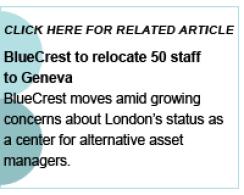
New regulations and higher taxes can cause fund relocation, monetary dislocation and a myriad of staffing problems for hedge funds. Two main problems are: not having enough money to pay their employees, and convincing these employees to uproot their families and relocate (not to mention funding such moves) if there are tax benefits to doing so.

And what about the little guys? This poses an even bigger problem for smaller London funds that are already fighting for their capital-raising lives. Two weeks ago I spoke on the phone with an exceptional hedge fund manager who, about a year ago, left the big leagues to launch his own fund. He is already asking if there is a larger platform that would absorb or “umbrella” his team, which means either employing them, or deploying capital. His firm is like many other hedge funds that are having trouble raising money in arguably the most difficult capital-raising environment for hedge funds.
His problem, shared by other London-based funds, is how to deal with the presumed upcoming higher taxes while having trouble raising money. His option is to move to another area, but risk losing his exposure. He has seen over 200 investors in the last year in London. “How do I get 200 investors to come to visit me in Geneva?” he asks.
The headaches do not stop there. The other problem for hedge funds is recruiting employees. When 80 percent of European hedge fund assets are in London, according to 2007 data from the Zurich School of Management and Law, how does one attract and retain employees from Switzerland? The talent pool in Geneva is undoubtedly a small fraction of what London offers today. This means more difficult recruiting, which will cost more money. Will higher recruiting and salary costs compensate for higher taxes and less investor exposure?
It’s a question many hedge funds are asking, but so far there is no clear answer.






